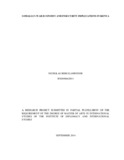| dc.description.abstract | Kenya and Somalia have benefitted from each other‟s warm and friendly relations. To
illustrate this there are a large number of Somalis who are working and living in Kenya.
Many have been involved in different kinds of businesses ranging from selling clothes to
opening of forex bureaus. Infact, their presence is much felt in different parts of the
country especially in Eastleigh which has been known as another “little Mogadishu.”One
can attribute this to their aggressive nature in business. Likewise, Kenyans are working in
Somalia either as businessmen or employed by the different NGO‟s there. However there
are some security challenges to the extent that it has been difficult for the Kenya embassy
in Somalia to open an office in Mogadishu. These challenges anchor mainly on include
terrorism, piracy, kidnappings, money laundering and Islamic radicalization of youth in
Kenya. The Kenya Defence Forces were deployed to Somalia following kidnappings of
tourists along the Kenyan coast; they are working together with forces from other African
countries. The statement of the problem in this study was the abundance of resources
such as fishing, charcoal and banana that Somalia has, but which it has not fully exploited
because criminals have used these resources in the black economy to perpetuate their
activities leading to a war economy in Somalia. The objectives of this research study
comprised of examining the nature and effect of security threats inherent in Somalia‟s
war economy, to establish factors underpinning the insecurities in Kenya rooted in the
Somalia‟s war economy and to assess the implications of Somalia war economy on
Kenya‟s security. This research was guided by the human needs theory as articulated by
Jerel A. Rosati, David J. Caroll and Roger A. Coate. Their main argument is that when
man is deprived of basic necessities of life, it causes them to release their anger at
anybody and everybody. The study used both qualitative and quantitative methods of
collecting data. This study used explanatory or descriptive research which identified four
study units namely-: NGO/civil society, government officials, security/military agencies
and the business community. These groups of people were chosen because they are
affected in one or another by Somalia‟s war economy; it was also interesting to hear the
different perceptions/views they made out of Somali‟s war economy and its insecurity
implications in Kenya thus making this study rich and diverse. These groups of people
provided 50 respondents. Data was analyzed using the Statistical Package for Social
Sciences (SPSS) thereafter conclusions and recommendations were derived from it. | en_US |

